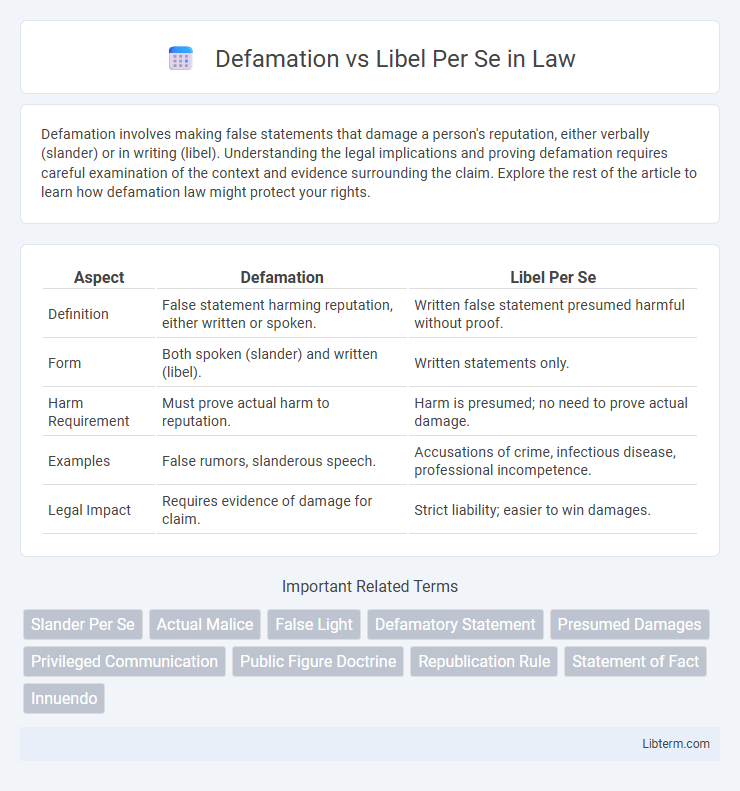Defamation involves making false statements that damage a person's reputation, either verbally (slander) or in writing (libel). Understanding the legal implications and proving defamation requires careful examination of the context and evidence surrounding the claim. Explore the rest of the article to learn how defamation law might protect your rights.
Table of Comparison
| Aspect | Defamation | Libel Per Se |
|---|---|---|
| Definition | False statement harming reputation, either written or spoken. | Written false statement presumed harmful without proof. |
| Form | Both spoken (slander) and written (libel). | Written statements only. |
| Harm Requirement | Must prove actual harm to reputation. | Harm is presumed; no need to prove actual damage. |
| Examples | False rumors, slanderous speech. | Accusations of crime, infectious disease, professional incompetence. |
| Legal Impact | Requires evidence of damage for claim. | Strict liability; easier to win damages. |
Introduction to Defamation and Libel Per Se
Defamation involves making false statements that harm a person's reputation, typically categorized into libel and slander. Libel per se refers to written or published statements that are inherently damaging, such as accusations of criminal behavior, a loathsome disease, professional incompetence, or sexual misconduct. Unlike general defamation cases, libel per se does not require proof of special damages, as the defamatory statements are presumed to cause harm.
Understanding Defamation: Definition and Scope
Defamation involves making false statements that harm an individual's reputation, encompassing both spoken (slander) and written (libel) forms. Libel per se refers specifically to written statements that are inherently harmful without needing further proof of damage, such as allegations of criminal behavior or professional incompetence. Understanding the distinction between general defamation and libel per se is crucial for assessing legal liability and potential damages in reputational harm cases.
What is Libel Per Se?
Libel per se is a category of defamation that involves false written statements so inherently harmful they are presumed damaging to a person's reputation without needing proof of actual harm. This includes accusations of criminal behavior, having a contagious disease, professional incompetence, or immoral actions. Because libel per se statements are automatically considered defamatory, plaintiffs are not required to demonstrate specific damages to succeed in a lawsuit.
Key Differences: Defamation vs. Libel Per Se
Defamation broadly refers to false statements damaging a person's reputation, whereas libel per se specifically involves written or published false statements harmful in themselves, without needing proof of damage. Key differences lie in the format--libel per se is always written, while defamation includes both written (libel) and spoken (slander) forms--and the presumption of harm, where libel per se presumes harm due to the nature of the defamatory statement. Understanding these distinctions is crucial for legal actions, as libel per se cases often allow plaintiffs to seek damages without proving actual injury.
Legal Elements Required for Each Claim
Defamation requires a false statement presented as fact that harms another person's reputation, with the plaintiff needing to prove the statement was published to a third party and caused damages. Libel per se, a subset of defamation, involves written or published statements inherently damaging to reputation, such as accusations of criminal conduct, a loathsome disease, professional incompetence, or unchastity, where damages are presumed and need not be proven. Key legal elements for defamation include falsity, fault, publication, harm, and identification, while libel per se emphasizes the nature of the statement as defamatory on its face, allowing plaintiffs to bypass damage proof.
Examples of Defamation and Libel Per Se
Defamation refers to false statements harming a person's reputation, including both slander (spoken) and libel (written). Examples of defamation include falsely accusing someone of theft or dishonesty, while libel per se specifically involves written statements that are inherently harmful, such as falsely alleging criminal behavior, having a contagious disease, engaging in immoral conduct, or professional incompetence. These categories require no proof of harm since the statements' damaging nature is presumed legally.
Burden of Proof: Plaintiff’s Responsibilities
In defamation cases, the plaintiff must prove a false statement was made that caused reputational harm, but in libel per se cases, certain statements are inherently damaging, shifting the burden of proof. Plaintiffs in libel per se do not need to demonstrate actual damages, as the law presumes harm from statements involving accusations of a crime, professional incompetence, or moral turpitude. This presumption accelerates legal proceedings, placing a critical emphasis on the defendant's ability to prove truth or other defenses.
Defenses Against Defamation and Libel Per Se
Defenses against defamation and libel per se primarily include truth, which completely absolves liability if the statement is proven accurate. Other key defenses involve the privilege of communication, such as statements made in judicial or legislative settings, and fair comment or opinion, protecting expressions of subjective views rather than factual assertions. Consent from the plaintiff and the absence of malice in certain jurisdictions can also serve as critical defenses in defamation and libel per se cases.
Potential Damages and Remedies
Libel per se refers to written statements that are inherently defamatory, such as accusations of a crime or professional incompetence, and typically allows plaintiffs to seek presumed damages without proving actual harm. Potential damages in libel per se cases include general damages for reputational harm, emotional distress, and sometimes punitive damages designed to punish egregious behavior. Remedies often encompass monetary compensation, retractions, and injunctive relief to prevent further publication of the defamatory statements.
Conclusion: Navigating Defamation and Libel Per Se Cases
Navigating defamation and libel per se cases requires understanding that libel per se involves statements inherently damaging to reputation, such as accusing someone of a crime or professional misconduct, which presumes harm without need for proof. Defamation cases often demand evidence of actual damages unless classified as libel per se, where harm is legally presumed. Legal strategies should emphasize the distinction between general defamation and libel per se to effectively address liability and damages claims.
Defamation Infographic

 libterm.com
libterm.com